Long live life on earth
Our pursuit of longer life cannot happen without a sustainable future for society and the planet. Julia Binder argues that we should target healthier lives for all, rather than for a few...
Audio available
September 22, 2021 • by Knut Haanaes in Magazine
The world’s topsoil is badly eroded and there may be only 60 harvests left. But solutions are at hand, says Geraldine Matchett of nutrition company Royal DSM....
Intensive farming methods, pesticides and fertilizers have provided more food as the world’s population has tripled over the past 70 years, leading also to a large reduction in the numbers living in poverty. But this has come at a heavy price, insists Geraldine Matchett, co-CEO of the Dutch nutrition company Royal DSM,
“In doing that, we’ve destroyed about a third of the topsoils in the world, because very intensive agriculture destroys the micro-organisms that keep the soil alive,” she says. “And as you do that, your yields go down and then you say: ‘I can fix that with more fertilizers’, but you’re simply destroying the soil even more. So it becomes a barren base.
“We’re looking today at how we can feed around 7.9 billion people, and maybe 10 billion in the future, in a world where these topsoils are being destroyed every single year. There’s an estimate that we have only 60 harvests to go, so 60 years before all topsoils are very depleted. Intensive farming, while feeding a lot more people, has actually destroyed the planet.”
A switch to a sustainable food supply system is urgently needed, but the good news is that the solutions are already known. “It’s about regenerative agriculture. It’s about not tilling the soil. It’s about rotating crops. It’s about applying ways of producing food that we can do but we’re not doing because of the current set-up of our food and agricultural systems. It requires a system change, as opposed to innovation or individual company contributions,” says Matchett.
The system change must involve the entire food industry, but it has to start with major changes in farming. “It requires the whole chain to start from a regenerative agriculture point of view and say that farmers should change their practices.”
It's very important that the farming communities are in the spotlight as heroes, as the source of the change, and not as villains
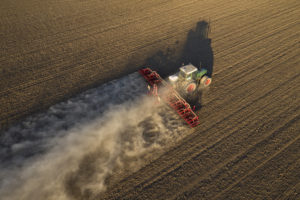
Intensive tillage greatly increases soil erosion and reduces soil density. Minimum tillage or no-till practices enhance soil aggregation and water retention.
 Increasing the number of crops grown on a farm and rotating them between fields increases biodiversity and reduces the risk of pests and diseases.
Increasing the number of crops grown on a farm and rotating them between fields increases biodiversity and reduces the risk of pests and diseases.
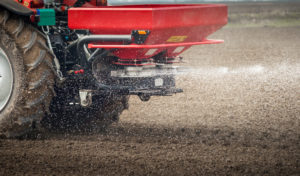 Synthetic fertilizers destroy micro-organisms that are vital for soil health, leading to less resilient plants. Using straw-rich manure instead promotes good soil structure and benefits many species.
Synthetic fertilizers destroy micro-organisms that are vital for soil health, leading to less resilient plants. Using straw-rich manure instead promotes good soil structure and benefits many species.
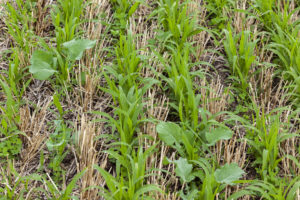 The planting of non-commodity crops after a harvest protects the soil until the next growing season. Such cover crops enable the soil to retain nutrients and keep harmful weeds under control.
The planting of non-commodity crops after a harvest protects the soil until the next growing season. Such cover crops enable the soil to retain nutrients and keep harmful weeds under control.
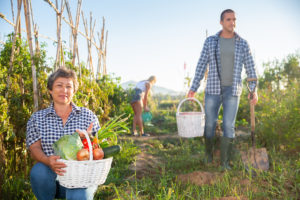 In 2019, the EAT-Lancet Commission said a shift to a more plant-based diet was necessary to feed the world’s growing population and reduce the food production industry’s carbon footprint.
In 2019, the EAT-Lancet Commission said a shift to a more plant-based diet was necessary to feed the world’s growing population and reduce the food production industry’s carbon footprint.
However, farmers can’t make this change by themselves. They need the support of all the other links in the chain. “The start is hundreds of millions of farming families whose livelihoods are already pretty difficult today. They don’t have the financial resources or the skills to make this transformation unless they are supported by all the stakeholders around them, so the whole food chain needs to align. But it’s also very important that the farming communities are in the spotlight as heroes, as the source of the change, and not as villains.”
Matchett believes the private sector has a key role to play, alongside governments, industry organizations and unions. Companies can no longer just think about their own operations but need to have a broader purpose, which means having an impact by helping to solve wider problems. “Your success partly depends on your ability to help the whole chain address its biggest challenges,” she says. “And the biggest challenge is often either the social or environmental impacts that we’re having.”
At DSM, this has involved focusing on the environmental footprint of dairy products. “There’s a great reason to have dairy products in terms of diets and nutrition, but how do you address the footprint? One of the many innovations that we’ve been working on is how to reduce the environmental footprint of dairy and meats.”
As the world leader in micronutrients for animal feed, DSM has been looking at ways of reducing the methane generated by cows, which is a significant contributor to climate change. “At first, people found this very strange, but it is connected with climate change – methane is 20 times more potent than CO2 – and it also has to do with agriculture. So, over time you realize that it’s a very serious value proposition because it is actually exactly the challenge facing the dairy industry today,” she says.
However, such efforts need to be backed by better tools for measuring environmental and social impacts, particularly in the food industry.
Dutch State Mines (De Nederlandse Staatsmijnen) is established by the Dutch government to mine coal reserves in the southern province of Limburg.
Starts chemical activities with the opening of the Emma coke works.
Post war Diversification into bulk chemicals and petrochemicals.
Closure of last coal mine. DSM is now a chemicals company.
Stock market listing with the flotation of 70% of the company’s shares.
Privatization completed with flotation of remaining 30% stake.
Move into biotech with acquisition of Gist-brocades.
Sale of petrochemical activities to Sabic.
Acquisition of Roche vitamins and fine chemicals division.
Shift of focus to health and nutrition through series of acquisitions (Martek, Fortitech, Tortuga, Erber Group).

“We need to do a better job at measuring things. For instance, the true cost of food does not exist. A lot of externalities are absolutely not reflected in the cost of food.”- Geraldine Matchett, co-CEO of the Dutch nutrition company Royal DSM
DSM itself has undergone a major transformation during its 119-year lifetime. It started out as Dutch State Mines, a coal mining company, then it moved into petrochemical refining, commodity chemicals, biotech and fine chemistry, and today it is one of the world’s biggest food ingredients companies, with 85% of its sales in nutrition and health. Much of the transformation has been achieved through acquisitions and disposals, but this has been accompanied by an increasing focus on sustainability, which is built into its bonus and incentive systems, with 50% of rewards linked to the company’s financial performance and 50% to social and environmental goals. “We are a triple bottom line People-Planet-Profit company, so we said, let’s ‘walk the talk’ and signal to everybody that both are important,” says Matchett.
She says sustainability strategies of companies need to be underpinned by three components: Reduce, Enable and Advocate. Reduce relates to the management of your company’s impact on the world, while Advocate involves arguing the case for wider actions to tackle climate change. The previous generation of business leaders made a good start in both areas. Enable involves using your own activities to seek broader changes, such as DSM’s push for more sustainable agricultural practices, and Matchett thinks this is a job for the next generation.
“Enable is today’s challenge. It means that leaders who are in position today, or emerging leaders, need to start thinking about how their activities actually enable them to alter the system.” This represents a paradigm shift from the time when the only focus of companies was on prices and commercial pressures. “Now it’s about what are we trying to achieve and how we do it together, which is a fundamentally different way of looking at how to make a company successful.”
Doing well and doing good, in our view, are intrinsically linked, but on slightly different timeframes
This means putting sustainability at the core of the company’s strategy, making it something that is handled at board level, rather than just by a separate sustainability department, and embedding it into individual business cases. “You will not be successful if you ignore these things, so put them in. At first you may not be rewarded for it, but over time you will be. So doing well and doing good, in our view, are intrinsically linked but on slightly different timeframes,” she says.
It also involves looking well beyond your own organization, working with suppliers and customers to change the whole value chain. “You have to think about working upstream and downstream in an integrated end-to-end system way,” she says.
The Task Force on Climate-related Financial Disclosures has prompted many companies and investors to think about the cost of the impact of climate change on a firm’s operations if such systemic changes are not made. “In some cases, it’s catastrophic and therefore you’d much rather help the world transition to a situation in which climate change is limited to 1.5C. It requires some sacrifices and some investment now, but it’s nothing in comparison to the mitigation that is needed in a world that goes above two degrees and all that comes with that,” she says.
Matchett suggests the COVID-19 pandemic showed that it was possible to make big changes when really needed. “We saw how quickly things can move when everybody understands the problem and is aligned in having to react. And then you realize the power of companies, because you have the authority and the means to make things change overnight.
“When the crisis hit, we moved fast. Unfortunately, when it comes to food, if we wait until the crisis really hits, it will be too late. So that’s the challenge: how do we not wait for the crisis?”
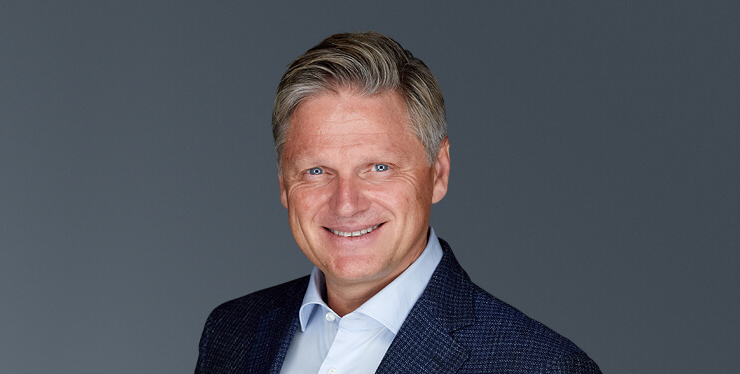
Lundin Chair Professor of Sustainability at IMD
Knut Haanaes is a former Dean of the Global Leadership Institute at the World Economic Forum. He was previously a Senior Partner at the Boston Consulting Group and founded their first sustainability practice. At IMD he teaches in many of the key programs, including the MBA, and is Co-Director of the Leading Sustainable Business Transformation program (LSBT) and the Driving Sustainability from the Boardroom (DSB) program. His research interests are related to strategy, digital transformation, and sustainability.
February 16, 2026 • by Julia Binder in Sustainability • 9 min read
Our pursuit of longer life cannot happen without a sustainable future for society and the planet. Julia Binder argues that we should target healthier lives for all, rather than for a few...
 Audio available
Audio availableJanuary 27, 2026 • by Julia Binder, Knut Haanaes in Sustainability • 2 min read • 
Holcim’s Ram Muthu on circularity, EU regulation, and what it really takes to decarbonize cement at industrial scale....
January 23, 2026 • by David Bach, Julia Binder in Sustainability • 2 min read • 
Live from Davos: IMD’s Julia Binder and David Bach cut through the headlines on geopolitics, AI, energy – and competing visions for the international order....
January 19, 2026 • by Sara Ratti, Frederic Barge, Florian Hoos , Florence Hugard, Danielle Landesz Campen, Karl Schmedders in Sustainability • 12 min read
First-year CSRD and ESRS disclosures boost transparency in energy and utilities, but early evidence shows compliance is outweighing strategic insight....
January 13, 2026 • by Julia Binder, Knut Haanaes in Sustainability • 2 min read • 
IMD’s Inside the Transition hosts Pictet CSO Marie-Laure Schaufelberger to explore how finance drives the energy transition and ESG strategies....
January 8, 2026 • by David Bach, Felix Zeltner in Sustainability • 1 min read • 
In this episode of Leaders Unplugged, IMD President David Bach speaks with Rolf Habben Jansen, CEO of Hapag-Lloyd, about leading a global shipping giant through geopolitical tension, climate pressure, and permanent uncertainty,...
December 29, 2025 • by Frédéric Dalsace, Goutam Challagalla, Julia Binder, Florian Hoos , Sara Ratti, Adrian Dellecker, Howard H. Yu, Michael R. Wade, Vanina Farber, Karl Schmedders in Sustainability • 12 min read
In 2026, sustainability moves from lofty ambition to hard-nosed execution, driving resilience, competitiveness, and real business value. From circularity to AI-enabled energy systems and sustainable product design, IMD experts see action taking...
December 12, 2025 • by Julia Binder, Manuel Braun in Sustainability • 13 min read
Fritz-Kramer, the fourth-generation CEO of the 125-year-old family firm, is on a mission to change how Europe builds and lives more sustainably. ...
December 2, 2025 in Sustainability • 3 min read
Four books bring together the best I by IMD articles on leadership, strategy, governance, and sustainable business transformation. ...
December 1, 2025 • by Julia Binder in Sustainability • 2 min read • 
In the second episode of IMD’s sustainability series, IMD's Julia Binder and Knut Haanaes welcome Kunal Chandra of RWE to discuss the energy transition....
Explore first person business intelligence from top minds curated for a global executive audience